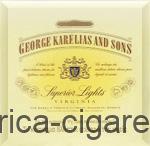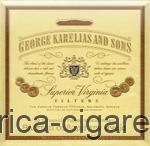President Donald Trump announced Friday his administration will pursue raising the minimum age to purchase e-cigarettes from 18 to 21 nationwide 555 cigarettes .
Mr. Trump told reporters his administration will release final plans for restrictions on e-cigarettes next week.
“We have to take care of our kids, most importantly, so we’re going to have an age limit of 21 or so,” the president told reporters outside the White House Friday 555 cigarettes.
Currently, the minimum age to purchase any tobacco or vaping product is 18, under federal law. But more than one third of U.S. states have already raised their sales age to 21. Ohio officially enacted its Tobacco 21 law on Oct. 17.
Ohio’s Tobacco 21 prohibits the sale e-cigarettes, chewing tobacco, pipe tobacco, and dissolvable nicotine products among others to persons under the age of 21.
A federal law raising the purchase age would require congressional action.
Administration officials were widely expected to release plans this week for removing virtually all flavored e-cigarettes from the market. Those products are blamed for soaring rates of underage use by U.S. teenagers.
While Ohio law prevents people under 21 from buying nicotine products, just a short way up north in Michigan, shops can still sell to folks 18 and older.
Peyton Davis, the 22-year-old owner of Darth Vapors in Blissfield, Mich., said raising the age to buy e-cigarettes to 21 “doesn’t make sense,” given that 18-year-olds can still buy tobacco in his state.
“So you’d have to be 21 to buy e-cigarettes, but only 18 to buy cigarettes?” Mr. Davis said. “That’s just dumb. You’re making a safer alternative less available to people.”
But, if tobacco were to also be raised to 21, that’s a move Mr. Davis may support.
Shaun Cloum, whose family owns Himalaya Vape in Temperance, Mich., said he’s supportive of raising the age to 21, and is only concerned about attempts being made by state and federal government to ban flavors.
“If the federal government wants to raise the age to 21, I would support that,” the 25-year-old said. “But only if flavors are still around and you allow the industry to still thrive.”
Mr. Cloum said raising the age will likely solve the problem of buyers selling to minors, therefore eliminating the need to ban flavors.
The news from Mr. Trump came on the same day the Centers for Disease, Control and Prevention, claimed it may have found a “breakthrough” in the investigation to what has specifically caused more than 2,000 confirmed cases of vaping-related illnesses and 39 deaths across the country.
Dr. Anne Schuchat, the CDC’s principal deputy director, at a news conference Friday, said her institute has identified vitamin E acetate as a “very strong culprit” to the illnesses that have sparked a crisis across the U.S. The compound — vitamin E acetate — was previously found in liquid from e-cigarettes and other vaping devices used by many of those who got sick. Officials said this is the first time they’ve found a common suspect in the damaged lungs of patients.
“We are in a better place in terms of having one very strong culprit,” Dr. Schuchat said at a news briefing. “...For the first time, we have detected a potential toxin of concern, vitamin E acetate, from biological samples from patients.”
On Thursday, Juul Labs, the nation’s largest e-cigarette maker, announced it would voluntarily pull its mint-flavored e-cigarettes from the market. That decision followed new research that Juul’s mint is the top choice for many high school students who vape.
The public health crisis has sparked debate about the safety of vaping devices and e-cigarettes across the nation over the past few months. In response, seven states ordered bans on the sale of flavored vapor products, which government officials say target children.
Best Sellers For November
The first states to pursue emergency bans — Michigan and New York — have since had those bans blocked by judges. In Massachusetts, Gov. Charlie Baker high-stepped a flavor ban and imposed a ban on all vapor products. That move faced backlash from the state’s own Cannabis Control Commission, which, at the backing of Superior Court Judge Steve Wilkins, chose not to uphold the decision, potentially putting medical marijuana users in the state on a path to regaining permission to vape.
In Ohio, a state where smoking marijuana is illegal, state regulators have attempted to sway medical marijuana users away from vaping, while proponents argue that it “provides rapid relief,” and is a better alternative than the other methods available. Gov. Mike DeWine urged lawmakers to ban the sale of e-cigarettes last month after concluding he didn’t have executive authority to impose a ban himself.
Toledo City Councilman Larry Sykes has also called for a ban on flavored e-cigarettes locally, pushing for the city to take action and not wait for the General Assembly to explore looking at a ban.
There are currently 52 cases of illnesses related to vaping in Ohio, and one case has been linked to Lucas County.













/2014-kent-hd-spectra-2.jpg)


No comments:
Post a Comment
Note: Only a member of this blog may post a comment.